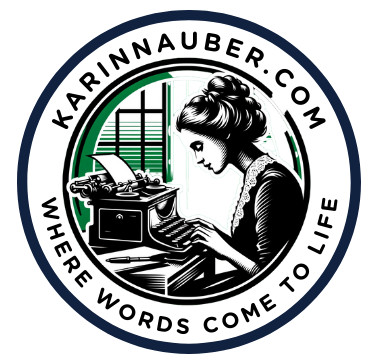I’ve been giving you several writing prompts over the past week or so. These are great. I have even used some of them. Nothing beats a prompt when you are struggling to get yourself writing again after a break—forced or not. If you have struggled with writer’s block, a good prompt can get you motivated to write again.
I have some more information for you in this post, but first I wanted to share a book with you that also might help get your creative juices flowing.
 It’s called, 5-Minute Daily Writing Prompts: 501 Prompts to Unleash Creativity and Spark Inspiration written by Tarn Wilson. It includes a series of daily prompts to choose from along with writing exercises that are only supposed to take five minutes a day. Well, I find that if I get inspired, I will write a lot longer than 5 minutes!
It’s called, 5-Minute Daily Writing Prompts: 501 Prompts to Unleash Creativity and Spark Inspiration written by Tarn Wilson. It includes a series of daily prompts to choose from along with writing exercises that are only supposed to take five minutes a day. Well, I find that if I get inspired, I will write a lot longer than 5 minutes!
The idea is to get the flow going and maybe even come up with your next great work!
I just thought I would share that with you because even though I am supplying you with prompts, it is always nice to get ideas from another writer’s mind!
On to today’s motivation!
Have you ever been stuck, staring at a blank page, feeling the dread of writer’s block creeping in? Well, you’re not alone. It’s a common hurdle for fiction writers everywhere. Writing prompts are like keys that unlock the imagination’s doors, letting the creative currents flow. They’re not just random sentences; they’re crafted insights that tap into your creativity and guide it.
 When I was younger I had thought about writing a prompt book. I can’t remember much about it now because I didn’t pursue it at the time. I just knew that I had tons of ideas for stories and no humanly possible way to write them all! I think I had called the book (in my mind, anyway) Story Starters. It was going to include prompts or one line story ideas. I had hundreds and hundreds of book titles and I thought I could turn most of them into prompts! Who knows? Maybe I will still do it!
When I was younger I had thought about writing a prompt book. I can’t remember much about it now because I didn’t pursue it at the time. I just knew that I had tons of ideas for stories and no humanly possible way to write them all! I think I had called the book (in my mind, anyway) Story Starters. It was going to include prompts or one line story ideas. I had hundreds and hundreds of book titles and I thought I could turn most of them into prompts! Who knows? Maybe I will still do it!
These clever little prompts can be lifesavers, especially when words seem to evade you. They give you a starting point, a spark that can ignite a whole world of characters, settings, and stories. Think of them as creative catalysts. Whether you’re a newbie looking for direction or a seasoned writer in need of a fresh perspective, writing prompts are invaluable tools in the writer’s toolkit.
Delving into the psychology behind the effectiveness of writing prompts, they work by providing a focused task that can sidestep the anxiety of the infinite possibilities a blank page represents. By narrowing the scope of where your mind can wander, they allow you to channel your thoughts more productively. Writing prompts also serve as a warm-up exercise for your mind, helping to limber up your creativity before you dive into a more extensive project.
If you want to push the envelope and extend beyond your comfort zone, prompts can be a way to explore new genres, themes, and writing styles. They’re all about opportunity and expansion – opening doors you might not have even considered walking through. And that’s just the start. As we move into the nuances of character creation, you’re going to find out about how specific prompts can not only kickstart your writing process but can help flesh out the very souls of your characters.
Crafting Characters: Prompts to Give Life to Your Protagonists
You know, character creation is one of those areas in fiction writing where a little nudge can lead to a cascade of inspiration. That’s where prompts come in handy. They’re not just questions or scenarios; they’re ignition keys for your imagination. And when it comes to breathing life into your protagonists, the right prompt can make all the difference.
Imagine a prompt that asks, ‘What secret does your character live with that influences their every decision?’ This isn’t just about crafting a backstory; it’s about rooting your character in a sense of mystery and depth that readers can’t resist. It’s prompts like these that can lead you to discover motives and conflicts you hadn’t considered before, adding layers to your characters that make them stand out.

Have you ever heard characters talking in your head? That might sound a bit out there, but it’s pretty common for fiction writers. Sometimes I can hear them clamoring for attention. They are whispering to be heard above the noise of real life!
Dialogue prompts can be powerful tools to help you hear what your characters might say. You might try out a scenario like, ‘Your protagonist has been falsely accused. What’s their defense?’ Suddenly, you’re not just writing speech; you’re revealing a character’s values, wit, and intellect.
In my opinion, every character is a mosaic of diverse experiences and traits. The inclusivity of different backgrounds, cultures, and identities can make your fictional world more relatable and rich. By choosing prompts that ask for such details, you’re committing to representation and authenticity in your stories – and that’s crucial for resonating with a wider audience. Now, with a cast of well-rounded protagonists in hand, let’s venture onward to where they live, breathe, and act out their stories – the world they inhabit.
Intriguing Settings: Prompts to Envision Your World
The setting of a story is much more than just a backdrop; it’s an essential component that breathes life into your narrative. Think of it as the stage where your characters’ dramas unfold, influencing the plot and the readers’ immersion.
To create a world that readers can practically walk into, consider these prompts. How would your character react to a sudden change in environment, or what’s the one place in this world that holds a deep secret? Use these sparks to dig deeper into the physical spaces of your story.

World-building is part and parcel of developing your setting. It requires attention to detail and an understanding of how different elements like social norms, politics, and even climate can influence the inhabitants. For fantasy and sci-fi writers, this also includes creating coherent rules for how magic or technology works in your universe.
A compelling fictional setting must strike a balance between the fantastical and the believable. Whether your story takes place in a dystopian future or an alternate history, grounding the extraordinary in the familiar helps readers suspend disbelief and invest in your story. Providing sensory details can go a long way; describe the intricacies of the architecture, the cacophony of a busy street, or the serene silence of a forest.
Next, let’s consider how you can infuse these settings with intrigue, leading to gripping plot developments. After all, a well-crafted setting does not only support your story but actively contributes to it.
Plot Twists and Turns: Storyline Prompts for Gripping Tales
You’re going to find out about the sheer thrill that comes from throwing in a curveball that leaves readers reeling. We’ve explored character depths and the realms they inhabit; now, it’s time to weave the unexpected into the tape played out by your words.
Story plots are the backbone of any good narrative, and I’m here to help you reinforce that structure. Through strategic prompts, you’ll sculpt conflicts that push your characters to their limits, and resolutions that offer both satisfaction and reflection for your readers.

If you want to keep your audience hooked, you’ve got to master the art of the plot twist. That’s where well-crafted prompts come in. They’re not just questions or suggestions; they are torchbearers illuminating paths you might not have seen.
In my opinion, the best stories always have that ‘aha!’ moment. The prompts I recommend are designed to usher you towards creating these revelations that make a story memorable.
Remember, your first attempt at crafting a plot twist might not be perfect, and that’s okay. The beauty of prompts is that they can help refine your storytelling as you go. You can always adjust your approach down the road.
Just don’t focus too much on perfection. Choose something that resonates with you, and let the prompts guide you to unexpected places. A lot is happening very quickly in a good story, and prompts can help you keep up with the pace.
Your path as a writer is uniquely yours, but it’s my hope that with these storyline prompts, you’ll uncover new avenues for your fiction that surprise and engage both you and your readers. Embrace the journey, and may your stories be as unpredictable and rewarding as the process of creating them.
 Plots, characters and all the elements of a great story can make your words come to life!
Plots, characters and all the elements of a great story can make your words come to life!
Karin

